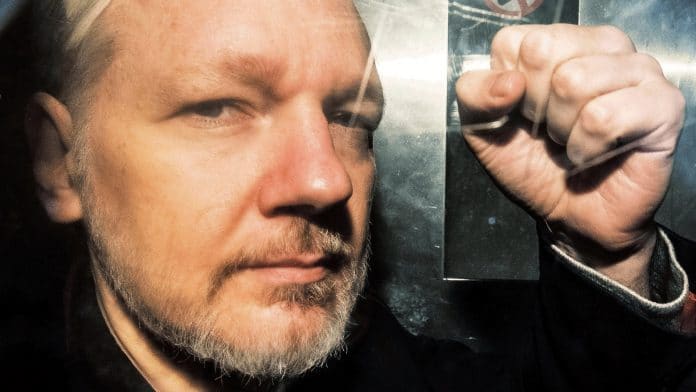Julian Assange indicted under espionage act, obtaining and publishing classified material, represents a grave threat to all Americans’ First Amendment rights, advocates across the political spectrum said Thursday.
The superseding indictment adds 17 counts of violating the Espionage Act of 1917 to a single previous count of conspiracy to commit computer intrusion that was revealed last month. Specifically, it accuses Assange, 47, of having illegally induced Army Pfc. Chelsea Manning to send him classified documents, some of which he published without redacting the names of confidential sources who provided information to U.S. diplomats.
Advocates and legal scholars said the indictment is designed to criminalize activity engaged in by journalists every day — publishing news of vital interest that they receive from someone who shouldn’t have given it to them.
“For the first time in the history of our country, the government has brought criminal charges against a publisher for the publication of truthful information,” said Ben Wizner, director of the Speech, Privacy and Technology Project of the American Civil Liberties Union.
“This is an extraordinary escalation of the Trump administration’s attacks on journalism and free speech, and a direct assault on the First Amendment,” Wizner said in a statement.
Jameel Jaffer, executive director of the Knight First Amendment Institute at Columbia University in New York, said the new charges weren’t unexpected, noting that the Espionage Act was cited in Assange’s original hacking charge last month.
But the added charges break frightening new ground, Jaffer said, because all previous cases under the Espionage Act targeted the government officials doing the leaking — not the publishers of their leaks.
“This is really what free speech and free press advocates have been worrying about,” Jaffer said in an interview on MSNBC’s “All In With Chris Hayes.”
“It really does cross a new frontier,” he said.
“You had the Bush administration begin prosecuting leakers as spies, and then you had the Obama administration prosecute more Espionage Act cases than all previous administrations combined,” he said. “But none of those prosecutions involved a publisher. Now we have a publisher.”
Regardless of whether Assange is ever tried, “the indictment itself is going to send a very chilling message,” he said.
In an analysis of the indictment on Thursday, the nonprofit Reporters Committee for Freedom of the Press argued that “the parallels between what a member of the news media does on a daily basis ought to be obvious.”
Advocates’ criticism found support among current and former government officials, as well.
David A. Kaye, the United Nations’ special rapporteur on the protection of freedom of opinion and expression, said on Twitter that “regardless of what you think about Wikileaks or Julian Assange, an Espionage Act prosecution can only turn out badly for press freedom in this country.”
And Matthew Miller, a justice analyst for MSNBC, pointed out that the Justice Department declined to charge Assange for just that reason during the administration of former President Barack Obama, when he was its chief spokesman.
